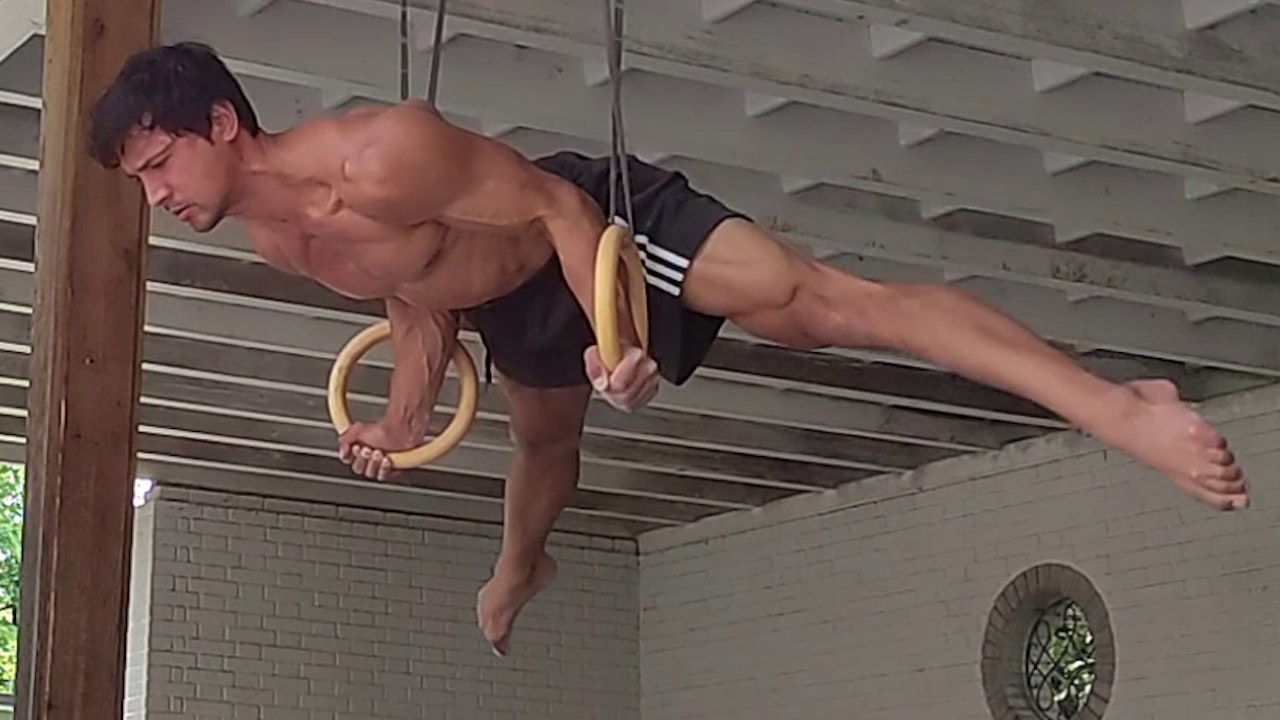'Rings' sequences & routines
Integrating strength & skill contexts on the gymnastics rings into extended sequences & routines is a simple way to develop further “complexity” in an upper-body strength practice. Notably, the work is now oriented around transitioning one’s body through a greater range of different forms, positions, and orientations in space, often involving changes in pushing/pulling mechanics (e.g. in extension/flexion, straight-arm/bent-arm) too.
Through the practice this not only develops the “hard” qualities of physical-capacity & conditioning further, but also “soft” qualities such as proprioceptive, kinaesthetic, and spatial-awareness, movement “intelligence” (i.e. an understanding of and proficiency in the logical transitioning between forms), and confidence.
LEARN MORE (subscriber-only):
https://drive.google.com/file/d/1S1T0yuA-r1-TTgthmIDTMMsSlvdcyr7t/view?usp=drive_link
-
Foundational SAS ring-sequences
THE WHAT:
These example contexts aim to demonstrate that creating sequences on the gymnastics rings is immediately accessible for most, and can be incorporated in the very early stages of practice. Straight-arm strength (SAS) routines are proposed to be more accessible than bent-arm strength (BAS... -
SAS rings routine (1.0)
THE WHAT:
This fundamental SAS routine incorporates hanging straight-arm scapular-strength (SASS) in the form of the 'Active hanging L-sit' (AHL), transitions through straight-arm strength (SASS) pulling in shoulder flexion (i.e. to the front of the body as the hips are brought through the backwa... -
SAS rings routine (1.1)
THE WHAT:
This fundamental SAS routine incorporates hanging straight-arm scapular-strength (SASS) and straight-arm strength (SASS) in hanging shoulder-flexion/extension by pulling into/out of the ‘GH’ form, and spending time with a ‘FL’ isometric on the exit.It progresses from ‘SAS 1.0’ by incr...
-
SAS rings routine (1.2)
THE WHAT:
This fundamental SAS routine incorporates hanging straight-arm scapular-strength (SASS) in the form of the 'Active hanging L-sit' (AHL), transitions through straight-arm strength (SASS) pulling in shoulder flexion (i.e. to the front of the body) to enter ‘Inverted-hang’ (IH), into shoul... -
SAS rings routine (1.3)
THE WHAT:
This fundamental SAS routine incorporates straight-arm strength (SAS) pulling forms in both hanging shoulder-flexion/extension in the ‘Front-lever’ (FL) and ‘Back-lever’ forms. It develops from ‘SAS rings routine 1.1’ by changing the ‘German hang’ (GH) for a significantly more intense B... -
SAS rings-routines with 'Meathook' (MH)
THE WHAT:
3 different rings-sequences presenting possible integrations of the ‘Meathook’ skill into routines. They are notably all presented in the context of straight-arm strength (SAS) development in a position hanging UNDER the rings for the benefit of focus on learning the TRANSITIONS between... -
Rings forward-roll to 'Bent-arm support' (BAs)
THE WHAT:
A logical development to the 'Rings forward-roll' and a step toward integrating within a rings-routine, here the momentum from the roll is CONTINUED in order to keep the hips high and extend DIRECTLY into the 'BAs' form. The latter then returns to 'Ring-support' from where a sequence ca... -
'Muscle-up' & forward roll / to 'BAs'
THE WHAT:
Another logical development in the integration of bent-arm strength (BAS) forms on the gymnastics rings (each relying on experience & proficiency with the individual pieces), now bringing together the worlds of “hanging” under the rings, “support” above the rings, and therefore opening ... -
Finishing BAS ring-routines in 'IH' (through 'BAp')
THE WHAT:
These sequences demonstrate a range of possibilities for working ABOVE the rings (predominantly BENT-arm strength/BAS-oriented) before transitioning back BELOW the rings through a transition into ‘IH’, from where a further STRAIGHT-arm strength/SAS) routine can be added. Notably, all th... -
BAS & SAS rings-routine 'intermediate' 1
THE WHAT:
This rings-routine expresses capacities & skills developed as dedicated BAS/SAS projects to themselves within an integrated bent-& straight-arm strength (BAS/SAS) sequence. It is useful as a “bang for buck” maintenance & conditioning routine, keeping complexity low and focusing on expre...












